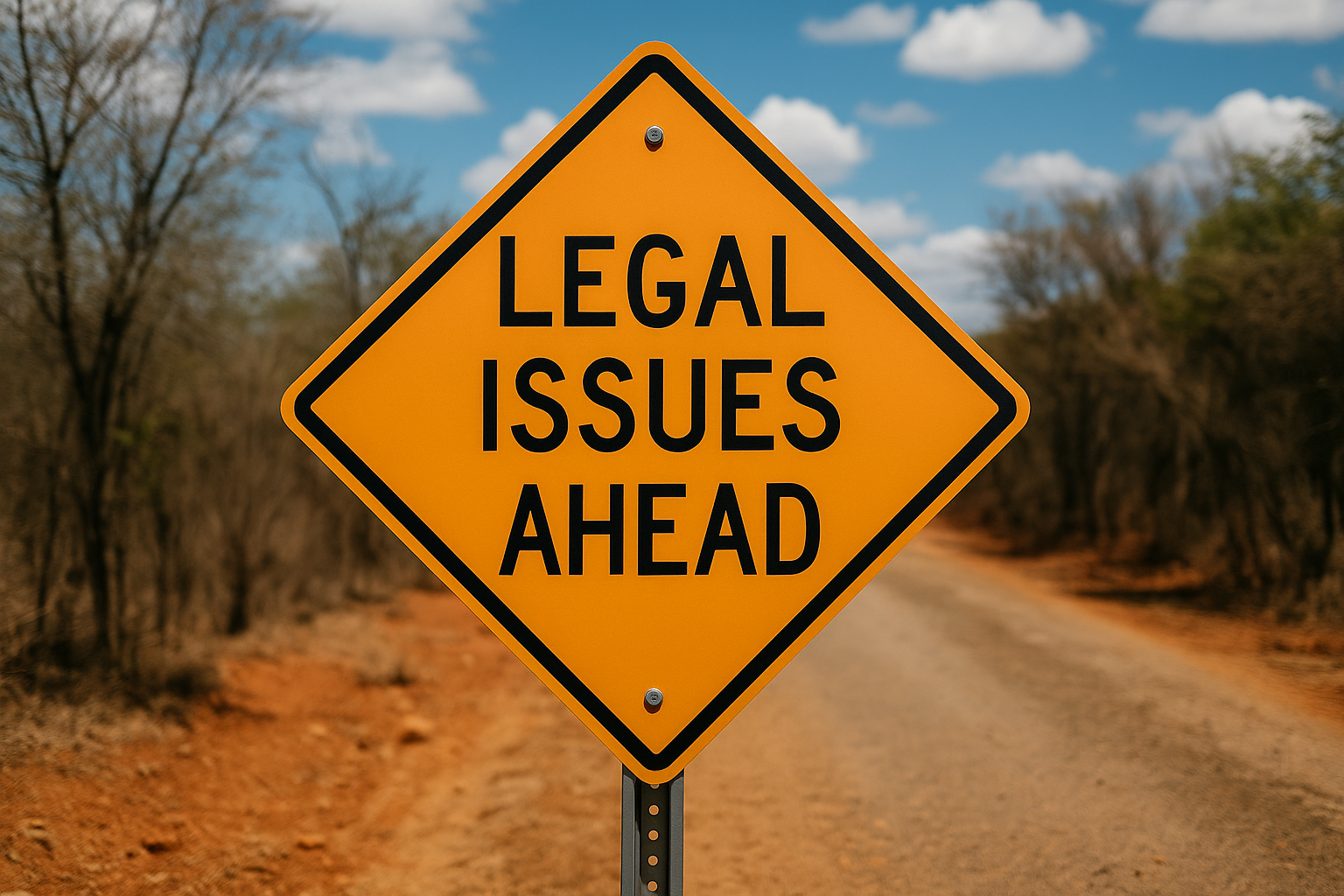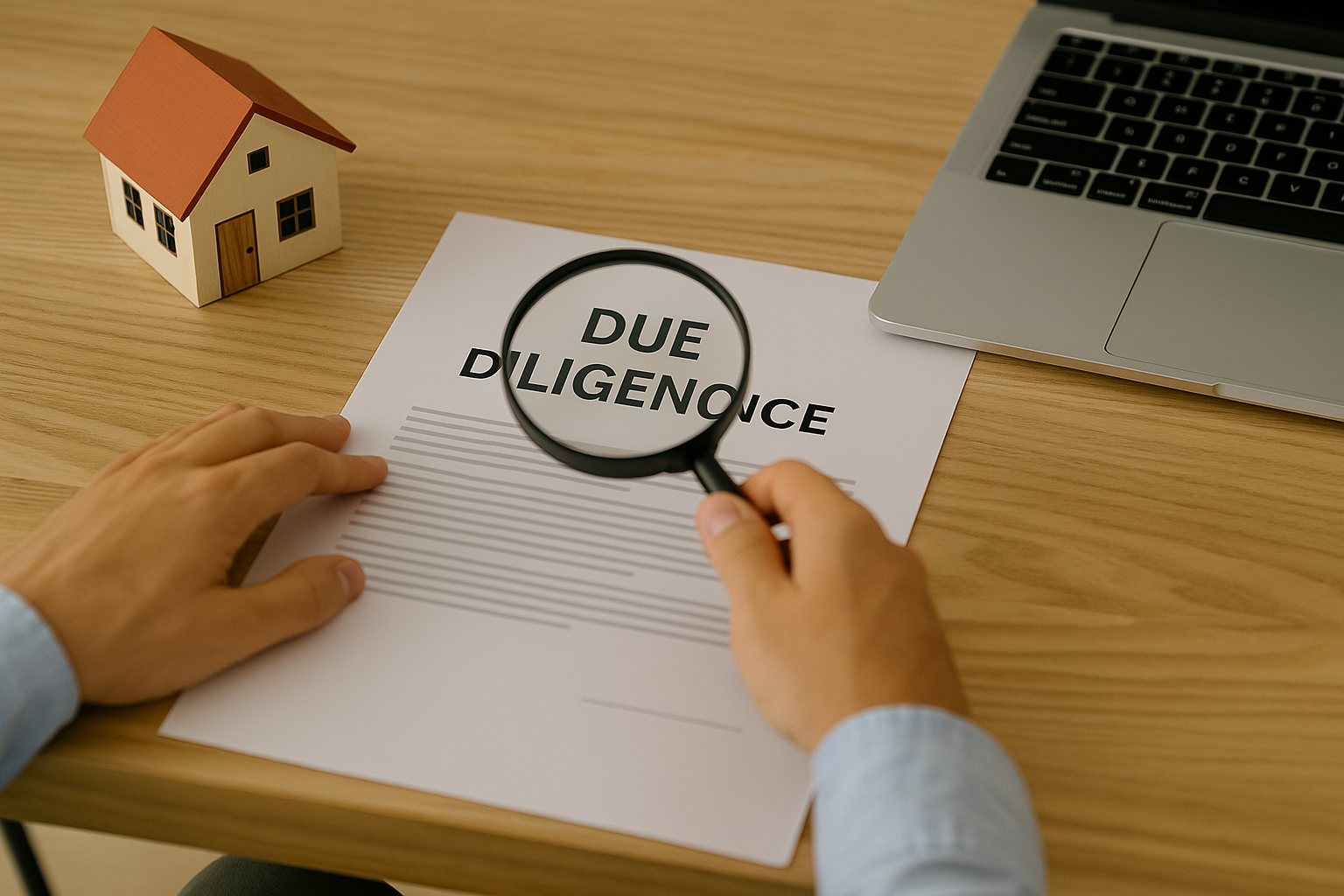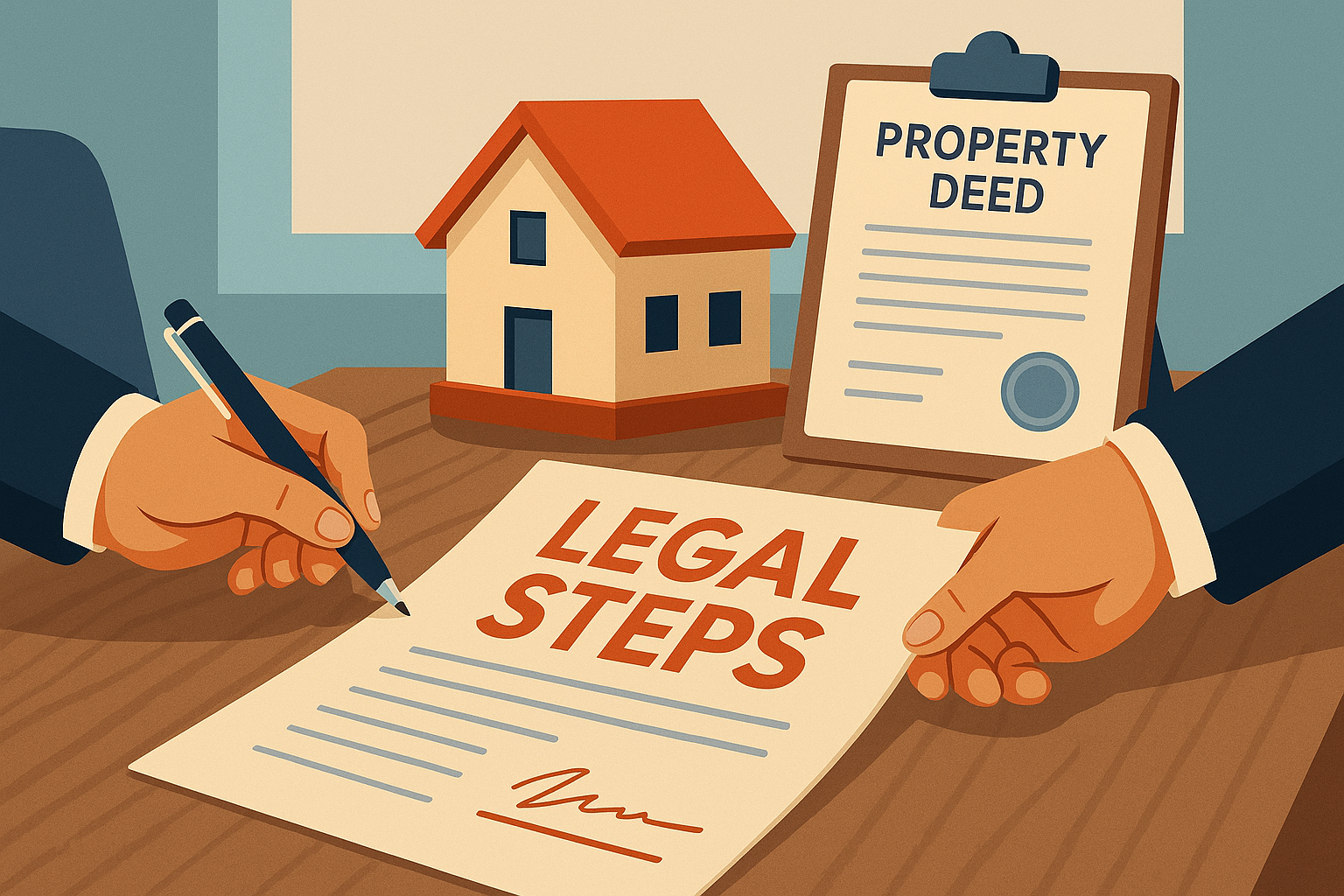1. The Deal Looked Perfect Until It Wasn’t
They found the land on a Saturday morning drive, five acres just outside Nairobi, red soil, flat terrain, good access road. The seller was an older gentleman, well-spoken, with papers in order, a copy of the title deed, ID, PIN and a glowing referral from someone they trusted.
They moved fast. Paid a deposit. Took selfies on the land.
Three months later, they were served with a demand letter.

Turns out the land had already been sold, twice. The title was real, yes but the seller had used it to con multiple buyers in quick succession and the registry records hadn’t caught up. Worse, the “agent” facilitating the transaction had disappeared. The buyer was now KES 1.2 million down, stuck in a civil dispute and the land was under caution.
The problem? They trusted documents, not the process. They assumed a physical title equals ownership. They never ran a registry search, never verified the seller’s capacity and never involved a lawyer, because the seller
“seemed genuine.”
This story is not rare. It’s happening every week, in Nairobi, Kisumu, Naivasha, Mombasa. The land market in Kenya is high-stakes, emotionally charged and legally unforgiving. If you miss even one step, you can lose everything.
2. Why Land Transactions in Kenya Are a Legal Minefield
Kenya’s land sector is layered with complexity and not by accident. The combination of historical injustices, bureaucratic loopholes and opportunistic fraudsters has turned land buying into a legal minefield.
Here’s what most buyers don’t see until it’s too late:
Fake Titles Still Circulate
Some are outright forgeries. Others are
“genuine fakes”,
issued legally but based on fraudulent claims or duplicated across different plots. The Land Registry isn’t always up to date, especially in areas transitioning from manual to digital systems.
Multiple Claimants, Same Land
It’s common for different parties to claim ownership over the same parcel, especially where succession, allotments or trust land is involved. You may buy from someone with a title, only to face a court injunction from a relative claiming inheritance rights.
Unregistered or Unsurveyed Land
Many plots, particularly in peri-urban or rural areas, were sold based on allotment letters not actual title deeds. These are not recognized as conclusive proof of ownership under Kenyan law. Until land is formally registered, it’s floating in legal limbo.
Forged Supporting Documents
IDs, PINs, land control board consents, even survey plans, all can be forged. Unscrupulous sellers often prey on diaspora buyers or first-time investors who rely on intermediaries and fail to cross-check details independently.
Collusion Within Institutions
There have been cases where lawyers, surveyors, land officials and brokers work in tandem to mask illegalities. Just because a lawyer is involved doesn’t make the deal safe, especially if it’s the seller’s lawyer.
Buying land is a legal operation.
And in Kenya, the law doesn’t protect the careless. It protects the thorough.

3. Start With Due Diligence
When our client first saw the land, it felt like a dream deal, lush, accessible and “clean” on paper. The seller even dropped the price slightly “to close fast.” But when we paused everything and ran a proper title search, that dream almost turned into a legal nightmare.
Here’s how it unfolded and what you must do before even discussing price:
i. Lands Registry Search
This is your first non-negotiable step. We ran a title search at the lands registry and immediately spotted discrepancies, the title presented was not the latest entry on the green card. A prior transfer had been registered but not reflected on the title in hand. That raised red flags about the seller’s actual ownership status.
A title deed is not conclusive evidence unless it matches the latest entry in the registry’s green card. The real owner is the person listed in the register not just the person holding a piece of paper.
ii. Verify the Seller’s Identity and Legal Capacity
We requested the seller’s ID, KRA PIN and proof of authority, in this case, a Power of Attorney. In other cases, sellers present as sole owners while the property is actually co-owned or subject to succession disputes.
Under Kenyan law, selling land requires legal capacity, which means rightful ownership or authorized agency. If the seller is holding land in trust or acting for a deceased’s estate, they need formal letters of administration or a confirmed grant.
iii. Ask for Mutation Forms and Survey Maps
In this case, the land was said to be a “subdivision,” but we discovered the mutation forms hadn’t been processed. The coordinates on the ground didn’t match what the seller claimed.
A mutation form shows that the parcel was lawfully subdivided. Without this and proper survey data, you could be buying a plot that does not exist legally or is positioned differently from what’s shown.
iv. Peruse the Green Card and Land Control Board Consent
When we perused the green card, the land’s historical ownership record and asked some diffcult questions, the seller got defensive. That alone told us to pause. Later, we found out the parcel had been flagged in a past dispute.
Transactions involving agricultural land must have LCB consent. Failure to obtain it renders the transaction void. The green card reveals the transaction history any red flags, caveats or encumbrances.

Bottom line, you do due diligence first or you pay for someone else’s mistake later. The right process may delay the deal but it also saves you from years in court trying to undo it.
4. The Red Flags You Must Never Ignore
Back to our client’s story, once we started asking questions, things shifted. What began as a friendly, flexible seller turned into someone suddenly “too busy” to provide key documents. “Can’t we just do this quickly?” they asked. That was our cue to slow everything down.
If you ever hear “Let’s just sort it in the lawyer’s office” without full documentation upfront, walk away or hit pause.
Here are the non-negotiable red flags that should make you pause immediately:
i. Unwillingness to Share Documents
If the seller delays or refuses to share the title deed, mutation forms (if applicable), PIN certificate or ID copy, that’s not “normal caution.” That’s a risk of fraud or ownership uncertainty.
You cannot complete due diligence without these documents. Lack of transparency is often tied to forged titles or encumbered parcels.
ii. Pressure to Pay Fast
Statements like “There’s another buyer ready with cash” or “I’m travelling next week, let’s close now” are classic tactics used to rush unsuspecting buyers into skipping due diligence.
Once money changes hands, especially without clear escrow protections, you’ve given up leverage. And you’ll struggle to recover it if the title turns out defective.
iii. Inherited Land With No Confirmed Grant
If the land belonged to a deceased person and the family is selling it, you must demand a confirmed grant of letters of administration or probate not just a death certificate and verbal assurance.
The Law of Succession in Kenya is strict, land cannot be transferred unless the estate has gone through formal succession. Many land cases clogging the courts stem from illegal transfers of inherited property.

In Kenya, the biggest red flags aren’t just obvious lies, they’re the soft excuses and subtle pushbacks that try to get you to trust without verifying. Every skipped step is a future court date waiting to happen.
5. Legal Steps That Turn Interest Into Ownership
Once we helped our client walk away from the shady deal, we found a cleaner, verifiable parcel. This time, we followed the law, step by step and the difference was night and day.
If you’re serious about buying land, this is the legal path that turns interest into actual ownership. Skipping any of these steps is not just risky it could mean you never legally own the land at all.

Step 1: Conduct Due Diligence then Negotiate and Sign a Sale Agreement
After confirming the seller’s identity and ownership through a comprehensive due diligence process led by your lawyer, your lawyer should draft a sale agreement. It captures the purchase price, timelines, agreed conditions and remedies if anything goes wrong.
Never use WhatsApp or handshake deals. Even a deposit must be tied to a signed agreement.
Step 2: Obtain Land Control Board (LCB) Consent (If Agricultural Land)
For agricultural land, especially in rural areas, LCB approval is a legal requirement before any transfer. The buyer and seller appear before the board to confirm the transaction is legitimate.
Without LCB consent, the transaction is void under the Land Control Act, no matter how much you paid.
Step 3: Pay Stamp Duty and Present Documents for Assessment
Your lawyer will lodge the documents, title deed, sale agreement, etc., for stamp duty assessment. Stamp duty is usually 4% of the property’s value in urban areas and 2% in rural areas.
The payment is made through KRA’s iTax system and must be cleared before registration.
Step 4: Register the Transfer at Lands Registry
Once stamp duty is paid, the final documents are lodged for registration at the relevant lands registry. This includes the transfer form, title, PINs, consent letters (if applicable) and proof of stamp duty.
Once processed, a new title is issued in your name and only then can you truly call yourself the legal owner.
Step 5: Post-Registration Checks
After registration, obtain a green card extract or official search showing you as the registered owner. This is what proves you didn’t just buy land you acquired full legal ownership.
Buying land in Kenya is a multi-step legal process that must be tightly managed to ensure your ownership is legitimate, enforceable and clean.
6. Agents, Brokers & Middlemen: Who’s Liable When Things Go Wrong?
Back in our client’s failed deal, one thing stood out, they had been introduced to the seller by a flashy broker, no contract, no paper trail, just promises and pressure.
When the deal collapsed, everyone vanished. The client asked:
“Can I sue the broker?”
Legally? It depends on how the relationship was documented or not.
Most agents, brokers and land scouts operate informally. But informality doesn’t equal immunity as long as you structure it right.

Always Demand a Written Mandate
If you’re engaging an agent, put it in writing. The document should clearly state:
i. Who they represent (you or the seller not both);
ii. Their scope (introductions, negotiations, etc.);
iii. Their commission terms;
iv. That they have no authority to collect payment or sign on your behalf.
Without this, you’re flying blind. And if a dispute arises, there’s no legal basis to hold them accountable.
Never Pay Money to a Broker
Any legitimate land transaction should involve funds being transferred to:
i. A licensed law firm’s client account;
ii. A verifiable institutional escrow.
If a broker insists on holding or passing money, walk away. It’s not just bad practice, it’s a recipe for fraud.
Legal Recourse - But Only if the Structure Supports It
If the broker made false representations and there’s documented proof, you may have a claim for:
i. Misrepresentation;
ii. Breach of contract (if one exists);
iii. Fraud.
But without a written agreement or digital trail, e.g. emails, WhatsApp chats, enforcement becomes an uphill battle.
You can work with agents but do it on your terms, with your lawyer’s oversight and with paper to back it up. In land deals, the law protects the cautious, not the casual.
7. Why Verbal Promises Mean Nothing Without Paperwork
The seller told him,
“Don’t worry, we’ll handle everything, the title is clean.”
The buyer trusted him. There was even a handshake. But there was no signed agreement. No receipt for the deposit. No timeline. No fallback.
When the seller later changed the terms and demanded more money, the buyer had nothing to hold him to.

Under the Law of Contract Act, any contract for the sale of land must be in writing, signed by all parties and witnessed.
What You Must Have (No Exceptions):
i. Written Sale Agreement – with clear terms, obligations and payment timelines.
ii. Acknowledgement of Deposit – showing amount paid, when and for what.
iii. Clause on Dispute Resolution – where and how any disagreement will be resolved.
iv. Signatures – by both buyer and seller and preferably a witness.
Verbal promises fade. Documents speak. In land deals, if it’s not on paper, it doesn’t exist, legally or practically.
8. After the Transfer, Don’t Relax Yet
The buyer finally got their name on the title deed. Relief. Celebration. Then, six months later, someone else fenced off the land, claiming a prior interest. Why? Because no one updated the green card. The Registry still showed the old owner.
Too many land buyers in Kenya stop at the title, assuming the process is over. It’s not.

Confirm Green Card Update at the Lands Registry
The green card is the official record of land ownership. If it doesn’t reflect your name, a third party can use that loophole to claim ownership or even fraudulently sell the land again.
Fence and Take Possession
In Kenyan land law, actual possession strengthens your claim. Delay and you leave room for squatters or malicious claims of adverse possession.
Update County Rates and Land Rent Records
If the land is in an urban area or agricultural zone, unpaid rates or rent can accrue penalties. Update the records with your name and postal address.
Notify Local Authorities and Neighbours
In rural or semi-urban areas, informal boundaries and unwritten understandings still matter. Letting the local administration and neighbours know of your ownership deters encroachment and reinforces peaceful possession.
Post-transfer diligence protects your rights, defends your boundary and proves that the land is truly yours on paper and on the ground.
The Bottom Line: Don’t Buy Alone. Buy with Counsel
Land is emotional. It feels personal. But it’s also one of the most litigated assets in Kenya because too many buyers treat legal review as optional.
Here’s the truth, your lawyer is your firewall. A trained legal eye catches what your gut won’t, fake documents, bad clauses, encumbrances and deals structured to collapse later.
One land deal gone wrong can set you back years. And in Kenya, where fraud thrives on rushed transactions and verbal promises, the cost of skipping legal advice isn’t just financial, it’s emotional, reputational and sometimes irreversible.
Before you buy, involve legal counsel. Let them ask the uncomfortable questions. Let them slow you down. That pause could save you everything.
Need help? Broline & Associates Advocates handles land transactions with structure, clarity and discipline. We draft relavant documents and help you sleep at night.


.svg)



.webp)